Related Research Articles
JumpStart was an educational media franchise created for children, primarily consisting of educational games. The franchise began with independent developer Fanfare Software's 1994 video game JumpStart Kindergarten. The series was expanded into other age groups and beyond games to include workbooks, direct-to-video films, mobile apps, and other media under the ownership of Knowledge Adventure, which later assumed the name JumpStart Games.

Softimage, Co. was a company located in Montreal, Quebec, Canada that produced 3D animation software. A subsidiary of Microsoft in the 1990s, it was sold to Avid Technology, who would eventually sell the name and assets of Softimage's 3D-animation business to Autodesk.
Autodesk Media and Entertainment is a division of Autodesk which offers animation and visual effects products, and was formed by the combination of multiple acquisitions. In 2018, the company began operating as a single operating segment and reporting unit.
BrainPop is a group of educational websites founded in 1999 by Avraham Kadar, M.D. and Chanan Kadmon, based in New York City. As of 2024, the websites host over 1,000 short animated movies for students in grades K–8, together with quizzes and related materials, covering the subjects of science, social studies, English, math, engineering and technology, health, arts and music. In 2022, Kirkbi A/S, the private investment and holding company that owns a controlling stake in Lego, acquired BrainPop.
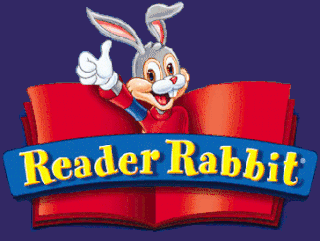
Reader Rabbit is an educational video game franchise created in 1984 by The Learning Company. The series is aimed at children from infancy to the age of nine. In 1998, a spiritual successor series called The ClueFinders was released for older students aged seven to twelve.

Big Thinkers is a short line educational game from Humongous Entertainment, which revolved around siblings Ben and Becky Brightly, two characters with the ability to shape-shift into any object they desire. The series contains two games: Big Thinkers! Kindergarten and Big Thinkers! 1st Grade. Both titles feature the same goal of collecting stars. The title was conceived and developed by Jonathan Maier.
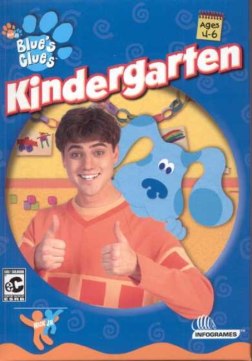
Blue's Clues Kindergarten is a Windows and Macintosh PC video game distributed on CD-ROM. Based on the television series Blue's Clues, kids can learn different skills that will help them get ready for grade school.

Kutoka Interactive was an educational software company founded in Montreal, Quebec, in 1995. The company produced, developed, and distributed both subject-based and grade-based video games for Windows and Macintosh from 1996 to 2017. They were most famous for their Mia games.
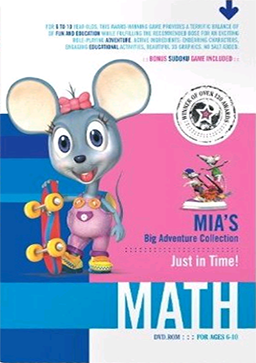
Mia's Math Adventure: Just in Time! is the third title of the Mia's Big Adventure Collection software series created by Kutoka Interactive. Released in 2001 in Canada and the United States, the game teaches mathematics to children between 6 and 10 years old.

Mia's Science Adventure: Romaine's New Hat is the second title of the Mia's Big Adventure Collection software series created by Kutoka Interactive. Released in 2000 in Canada and the United States, the game teaches sciences to children between 6 and 10 years old.
Mia's Big Adventure Collection is an edutainment software series created in 1998 by Kutoka Interactive. The series consists in five subject-based titles for children in elementary school.

Mia's Reading Adventure: The Bugaboo Bugs is the latest title of Mia's Big Adventure Collection software series created by Kutoka Interactive. Released in late 2007 in Canada and the United States, the game teaches reading to children between 5 and 9 years old.

Mia's Language Adventure: The Kidnap Caper is the fourth title of Mia's Big Adventure Collection software series created by Kutoka Interactive. Released in 2003 in Canada and the United States, the game teaches French and Spanish as a second language to children between 6 and 10 years old.

A first-person shooter (FPS) is a video game centered on gun fighting and other weapon-based combat seen from a first-person perspective, with the player experiencing the action directly through the eyes of the main character. This genre shares multiple common traits with other shooter games, and in turn falls under the action games category. Since the genre's inception, advanced 3D and pseudo-3D graphics have proven fundamental to allow a reasonable level of immersion in the game world, and this type of game helped pushing technology progressively further, challenging hardware developers worldwide to introduce numerous innovations in the field of graphics processing units. Multiplayer gaming has been an integral part of the experience, and became even more prominent with the diffusion of internet connectivity in recent years.
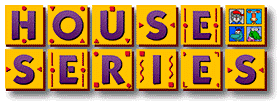
Early Learning House or simply the House Series is a collection of four main educational video games and two compilations for the Windows and Macintosh platforms, developed by Theatrix Interactive, Inc. and published by Edmark software. Each different game focuses on a particular major learning category with selectable skill settings for preschooler, kindergarten and elementary learners. Millie's Math House (1992) on mathematics, Bailey's Book House (1993) on language, Sammy's Science House (1994) on science, and Trudy's Time and Place House (1995) on history and geography. A spin-off, Stanley's Sticker Stories (1996), sees players create animated storybooks with the series' characters. Millie & Bailey Preschool and Millie & Bailey Kindergarten each contain the combined activities from two of the four software products. In addition the programs can be configured by an adult mode to suit students with special needs. Most of the activities in every game have two modes, one to allow learners to explore and try it out for themselves and the other for learners to follow specific tasks set by the game characters. Learners also have the option to print pictures of creative activities and record sounds in phonics activities. Later the games were re-developed by Houghton Mifflin Harcourt Learning Technology and re-published by The Learning Company with newer graphics and additional activities.
The Arthur video games franchise was a series of learning and interactive story video games based on the American-Canadian children's TV show Arthur. The games were released in the 1990s and 2000s for PlayStation and Game Boy Color alongside Windows and Mac OS computers.

Disney Learning: Winnie the Pooh comprises three titles: Winnie The Pooh Toddler, Winnie the Pooh Preschool and Winnie The Pooh Kindergarten. They are point-and-click educational video games developed and published by Disney Interactive and based on the Winnie the Pooh franchise. The titles were shipped by BAM! Entertainment.
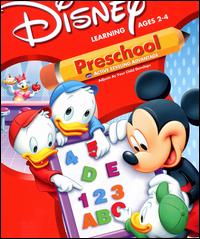
Mickey Mouse Toddler, Mickey Mouse Preschool, and Mickey Mouse Kindergarten are three sister educational video games by Disney Interactive. They are part of the Disney Learning Series, alongside similar Winnie the Pooh games, Mathquest With Aladdin, Reading Quest with Aladdin, Adventures in Typing with Timon and Pumbaa, Buzz Lightyear 1st and 2nd Grade, The Jungle Book 1st and 2nd Grade, Ready for Marth with Pooh, Phonics Quest, Search for the Secret Keys and Ready to Read with Pooh. Although not part of the series, the games Beauty and The Beast: Magical Ballroom and Ariel's Story Studio were frequently sold with the other games in promotional packages and advertised alongside them in trailers and commercials.

Reader Rabbit Toddler is a 1997 educational video game developed by KnowWare and published by The Learning Company. It is part of the Reader Rabbit series.
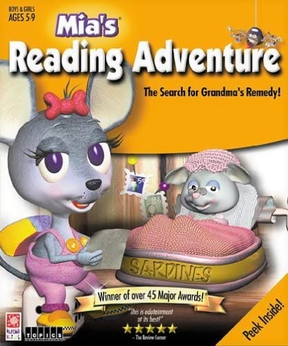
Mia's Reading Adventure: The Search for Grandma's Remedy is a 1998 video game developed and published by Montreal-based studio Kutoka Interactive. The game is aimed at children age 5.
References
- ↑ "Didi & Ditto - Their friends and their foes - page 1 Archived 2009-08-30 at the Wayback Machine ". Kutoka.com, retrieved on 2009-06-17
- ↑ "Didi & Ditto - Their friends and their foes - page 2 Archived 2008-12-05 at the Wayback Machine ". Kutoka.com, retrieved on 2009-06-17
- 1 2 3 "Didi & Ditto Kindergarten Archived 2009-11-28 at the Wayback Machine ", Kutoka.com, retrieved July 28, 2009
- ↑ Peter Cohen. "The Game Room Review: Busy As a Beaver Archived 2011-06-11 at the Wayback Machine ", Macworld, August 2004, retrieved July 28, 2009
- ↑ "Didi & Ditto -- Kindergarten", Games4Girls.com, August 2004, retrieved July 28, 2009
- ↑ Jinny Gudmundsen. Didi & Ditto Kindergarten, Common Sense Media, 2004, retrieved July 28, 2009
- ↑ "Children's Software Review: Didi & Ditto Kindergarten", Edutaining Kids.com, July 2004, retrieved July 28, 2009
- ↑ "Didi and Ditto: Kindergarten", Moby Games, 2004, retrieved July 28, 2009
- ↑ "Didi and Ditto: Kindergarten", Game Vortex, 2004, retrieved July 28, 2009
- 1 2 "Didi & Ditto Kindergarten: Awards Archived 2010-01-11 at the Wayback Machine ", in Kutoka.com, retrieved July 28, 2009
- ↑ "Winners of the 2004 BESSIE Awards", ComputED Gazette, 2004, retrieved July 28, 2009
- ↑ Don Oldenburg. "Didi & Ditto (Kindergarten)", Parents' Choice, fall 2004, retrieved July 28, 2009
- ↑ "Seal of Approval Winner Fall '04 - Didi & Ditto: Kindergarten", The National Parenting Center, 2004, retrieved July 28, 2009
- 1 2 "Didi & Ditto First Grade Archived 2009-09-29 at the Wayback Machine ", Kutoka.com, retrieved July 28, 2009
- ↑ Jinny Gudmundsen. "Didi & Ditto First Grade: The Wolf King Archived 2009-08-08 at the Wayback Machine ", Common Sense Media, 2005, retrieved July 28, 2009
- ↑ "Didi & Ditto -- First Grade: The Wolf King", Games4Girls.com, December 2005, retrieved July 28, 2009
- ↑ "Didi and Ditto: First Grade - The Wolf King", Moby Games, 2005, retrieved July 28, 2009
- ↑ "Didi and Ditto First Grade: The Wolf King", Game Vortex, retrieved July 28, 2009
- ↑ Tom Nelson and Mary F. O'Connor. "Didi & Ditto First Grade: The Wolf King Archived 2015-09-24 at the Wayback Machine ", About.com, retrieved July 28, 2009